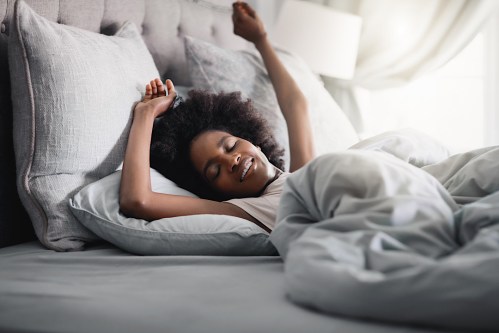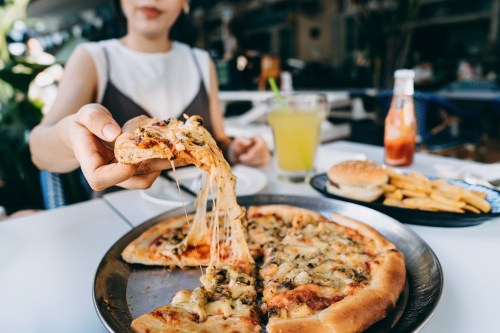From your mattress to how much coffee you chugged during the day to your bedroom’s mood lighting, there are so. many. things. that can affect our quality of sleep, and that includes the food that we eat, too. Thankfully, this year we learned a ton about eating for better sleep from our go-to RDs and sleep experts to help us step up our game in 2022. This includes the optimal times to eat without messing with your sleep cycle and what healthy, melatonin-rich snack one RD recommends keeping stashed on your nightstand for pre-bedtime snacking.
Experts in This Article
neuroscientist and author
assistant professor in medicine at Harvard Medical School and associate scientist at the Brigham and Women’s Hospital
registered dietitian and nationally-recognized food, nutrition, and wellness expert with a private nutrition counseling practice
sleep specialist and member of the American Academy of Sleep Medicine and the British Sleep Society
Ahead, find the top four nuggets of wisdom we learned about eating for better sleep worth taking into the new year.
1. Eat at least two hours before bedtime
We know that what we eat can impact our sleep quality, but when we eat can also affect our circadian rhythm, aka our 24-hour rhythm of activity. Sophie Bostock, PhD, also widely known as The Sleep Scientist, previously told Well+Good that the brain takes in signals from the outside world to keep the body in sync with its environment. Eating is one of those signals that tells the brain that it’s time to get to work and digest the food, not rest. So, if you eat a late dinner too close to your bedtime, when your head hits the pillow your body doesn’t know it’s time to wind down and rest because it’s busy processing your meal.
For optimal sleep, Rebecca Robbins, PhD, a Harvard-trained sleep researcher and a sleep scientist at Brigham and Women’s Hospital, says the ideal time to eat dinner is at least two hours before bed.
2. Be consistent with mealtimes
On that same note, not only is it important to allow your body plenty of time to digest your food before you go to sleep, eating your meals at the same time every day can also contribute to better quality zzzs. This is because the body loves consistency, and sticking to roughly the same mealtimes for breakfast, lunch, and dinner every day as well as maintaining a regular bedtime helps keep the circadian rhythm steady because you’re working with it rather than against it, which can lead to chronic health problems.
“The [biological] clock exists to predict when to react, eat, drink, mate, and essentially survive,” Maj. Allison Brager, PhD, a neuroscientist in the U.S. Army and sleep specialist for Molecule, previously told Well+Good. “If the clock has predictability with predictable mealtimes, life is good,” she says. “We know this to be true because the number one threat of night shift work is weight gain, obesity, and metabolic disorders such as type 2 diabetes.”
3. Eat more sleep-friendly foods
If you’re really trying to elevate shut-eye time, incorporating foods that help promote better sleep into your weekly meal plan is definitely a good idea. Luckily, there are lots of them, so you can mix things up and keep your palate enticed. In particular, foods high in tryptophan such as salmon, edamame, and spinach are known to increase relaxation hormones and leave you feeling sleepy post-meal.
And, there’s one food in particular that nutrition and wellness expert Samantha Cassetty, RD, recommends for a restful night’s sleep: walnuts. Specifically, she suggests snacking on them before bed. Why? Walnuts are a great source of tryptophan, the relaxing mineral magnesium, and melatonin, a necessary hormone for quality sleep, which all work together. “If you think of your brain as having an on/off switch, magnesium is part of the machinery that turns the switch off,” Cassetty previously told Well+Good. “This helps you fall asleep; meanwhile, the rise in melatonin levels are making you feel sleepy, too. They work in different ways, but they both facilitate quality sleep.”
Not into walnuts? Pistachios are also packed with melatonin.
4. Reach for healthy midnight snacks
That said, no matter if you’re consistent with your mealtimes, there are bound to be days (such as after a particularly sweaty workout) that you wake up in the middle of the night hungry. RDs say you don’t have to tough it out until breakfast, reaching for a healthy midnight snack is a great idea as long as you’re opting for ones that aren’t difficult to digest and won’t mess with your sleep (we’re looking at you, sugar).
Other midnight snacks to avoid include alcohol, caffeinated teas, and any liquid really to prevent frequent trips to the bathroom. So, what should you snack on at night? RD-approved picks include tart cherries, pumpkin seeds, cottage cheese, kiwi, and banana with peanut butter for their sleep-promoting properties. The key is to keep the snack light. If you’re thirsty, RDs point to warm milk or a cup of chamomile tea to help soothe you back to sleep.
Oh hi! You look like someone who loves free workouts, discounts for cutting-edge wellness brands, and exclusive Well+Good content. Sign up for Well+, our online community of wellness insiders, and unlock your rewards instantly.
Sign Up for Our Daily Newsletter
Get all the latest in wellness, trends, food, fitness, beauty, and more delivered right to your inbox.
Got it, you've been added to our email list.











